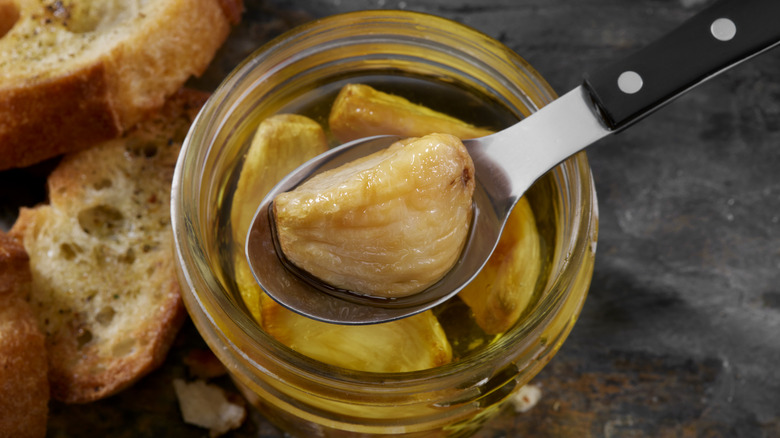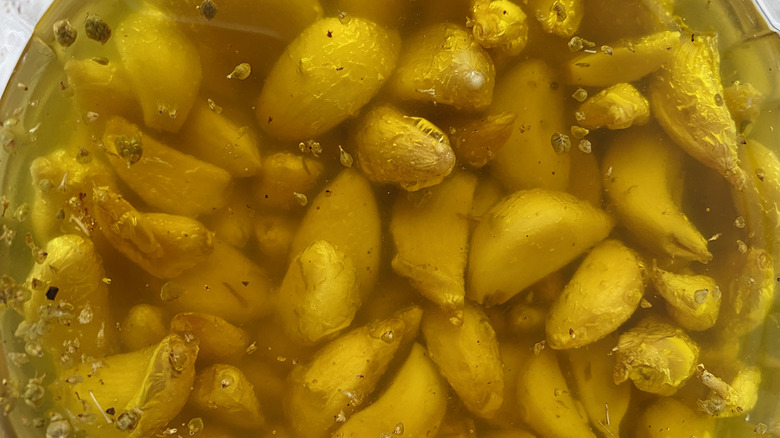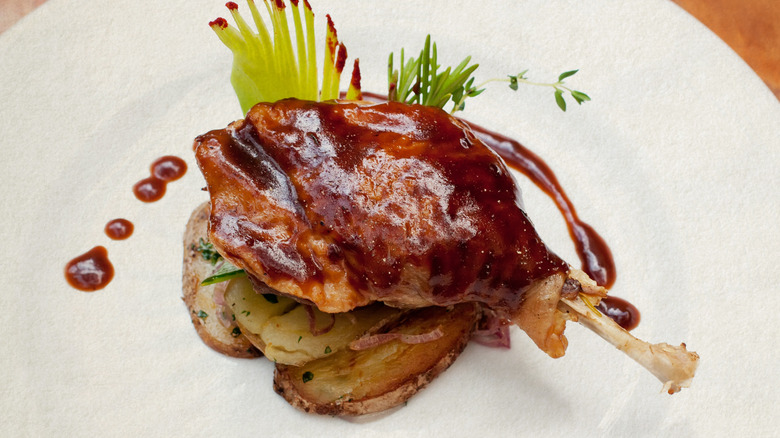How Long Can You Store Garlic Confit In The Fridge?
Ever find yourself faced with a mounting pile of garlic cloves that will go bad sooner rather than later? One of the best uses for them is to make garlic confit. You essentially slow-cook garlic that's submerged in oil, and you'll be left with a delicious, super-versatile garnish that's just as good spread on toast as it is when tossed with pasta. The only question is how long you should keep it in your refrigerator. While meat cooked confit-style, such as classic duck confit, can last up to a month in the fridge, garlic isn't as durable — it's best eaten within one week, per USDA standards.
This is all because of botulism, that dreaded bogeyman that many cooks fear when handling garlic in oil. The longer you keep garlic submerged in fat, the higher the risk of this rare but extremely dangerous foodborne illness. Clostridium botulinum, the toxic spores behind the sickness, thrive in low-oxygen environments that lack acid or sugar. This is why botulism is known to occur in improperly-treated or accidentally frozen canned goods.
With confit, the oil keeps garlic away from oxygen, and it contains no added sweeteners or acids like vinegar or lemon juice. The chances of botulism spores forming are fairly low, but it's not a risk worth taking. To extend its shelf life, you can freeze your garlic confit and it will last for months instead of a week.
How to make great garlic confit
Potential food safety concerns shouldn't scare you off from making garlic confit — you just have to use or freeze it before its time is up, which shouldn't be hard, as it's absolutely delicious. To make basic garlic confit, start off by prepping the garlic right. How you cut garlic affects its taste, and here, we're looking for whole cloves, as minced or sliced garlic can taste more pungent and will cook too quickly. They might burn before they develop the sweet, lightly caramelized flavor you want. Simply peel each clove and cut the root ends off.
While a neutral oil like canola or safflower will give you the most garlic-forward confit, letting its natural flavor come to the forefront, you have plenty of other options for cooking fats. You can turn to olive oil to bring some of its grassy flavor to the dish, and if keeping vegetarian isn't an issue, you can amp up the flavor by using animal products like pork or duck fats. Animal fat is the traditional choice for confit meats, and it's just as savory and delicious when paired with garlic.
While cooking the garlic in fat on the stove, keep the pot at a bare simmer. This allows the cloves to cook slowly as they concentrate their flavor. You can also add aromatics during this stage, such as rosemary or spices like black pepper, to bring even greater depth to the dish.
The history of confit
Today, most of us think of confit as a luxurious way of cooking, but it originated as a thrifty preservation method. The French term "confit" means "to preserve" in English, and the practice dates back to at least the 15th century. Cooks in the Gascony region of southwestern France made confit by heavily salting and cooking duck in its own fat. The meat was then stored in jars and kept in cool cellars, with the fat acting as sealant that helped prevent bacteria from growing.
Although the medieval French weren't aware of botulism, they certainly knew that confit extended the shelf life of their food. The story goes that confit gained popularity outside of Gascony during the reign of Henry IV, from 1589 to 1610. Henry hailed from duck confit's homeland, and he so deeply missed the dish that he had barrels of it shipped to Paris.
It's hard to say when garlic confit was first popularized, though the allium became popular in France during the 15th and 16th century, due to strong influence from Italy. Henry IV rears his head once more here; he was baptized in a mixture of water and garlic, which historians say is a sign that garlic had been embraced by the French upper class. When you make this delicacy from scratch and enjoy it on bread, a cheeseboard, or even a seared steak, it's hard not to feel like a king.



